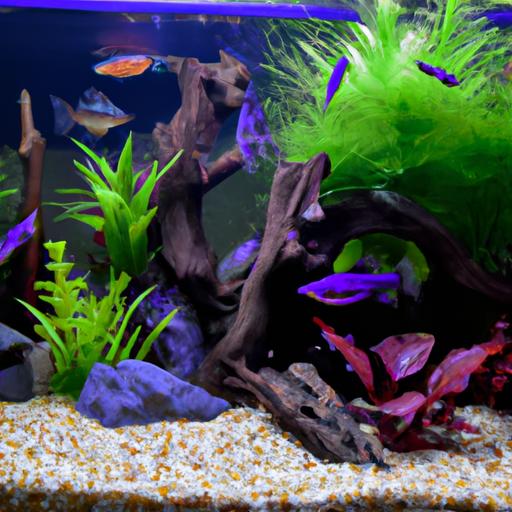
Choosing the Right Filtration System for Your Tank
Discover the ultimate guide to choosing the right filtration system for your tank. Ensure optimal water quality for your fish with expert advice.
Introduction
When it comes to maintaining a healthy and thriving fish tank, choosing the right filtration system is of utmost importance. A filtration system plays a crucial role in keeping the water clean, removing impurities, and providing a suitable environment for your aquatic pets. In this article, we will guide you through the process of selecting the perfect filtration system for your tank, ensuring that your fish live in a clean and well-maintained habitat.

Factors to Consider when Choosing a Filtration System
Before diving into the different types of filtration systems available, it’s essential to evaluate several factors that will influence your decision. By considering these key aspects, you can make an informed choice that caters to the specific needs of your tank and its inhabitants.
1. Tank Size and Capacity
The size of your tank is a crucial factor in determining the appropriate filtration system. Different tanks have varying water volumes, and the filtration system needs to be capable of effectively processing the entire volume within a reasonable time. Larger tanks require more robust filtration systems to ensure optimal water quality.
2. Type of Fish and Their Specific Needs
Another vital consideration is the type of fish you have in your tank. Different species have varying filtration requirements. Some fish produce more waste than others, while certain species may prefer specific water conditions. Research the specific needs of your fish and choose a filtration system that can accommodate their requirements.
3. Filtration Mechanism Options
Filtration systems generally operate through one or a combination of three mechanisms: mechanical, biological, and chemical filtration.
-
Mechanical Filtration: This type of filtration removes debris and particles from the water through physical means such as filter pads or sponges. It is essential for removing larger waste particles and preventing clogs in other filtration components.
-
Biological Filtration: Biological filtration relies on beneficial bacteria to break down harmful ammonia and nitrite produced by fish waste. It helps maintain a stable and healthy environment for your fish.
-
Chemical Filtration: Chemical filtration utilizes substances like activated carbon or chemical media to remove impurities, odors, and discoloration from the water. This type of filtration can be beneficial in certain situations, but it should not be solely relied upon for overall water quality.
Consider the specific needs of your tank and choose a filtration system that incorporates the filtration mechanisms most suitable for your fish and their environment.
4. Budget Considerations
While it’s essential to invest in a quality filtration system, budget is also a significant factor for many fishkeepers. Determine your budget range and explore filtration systems within that range. Remember that the initial cost of the system is just one aspect to consider; ongoing maintenance, replacement parts, and electricity usage should also be taken into account.
FAQ (Frequently Asked Questions)
Here are some common questions that fishkeepers often have when it comes to selecting the right filtration system for their tanks:
What are the different types of filtration systems available?
There are various types of filtration systems available in the market, including canister filters, hang-on-back filters (HOB), sponge filters, and undergravel filters. Each type has its pros and cons, so it’s essential to research and choose the one that best suits your tank’s requirements.
How do I determine the right filtration system for my tank size?
To determine the suitable filtration system for your tank, consider factors such as the tank’s water volume, the number and size of fish, and the desired water quality. Look for filtration systems that are specifically designed for the size of your tank and can handle the required water circulation and filtration rates.
Can I use multiple filtration systems together?
Yes, it is possible to use multiple filtration systems together, especially in larger or heavily stocked tanks. Using different types of filters can provide a more comprehensive and efficient filtration process, improving water quality and reducing maintenance requirements. However, ensure that the combination of filters is compatible and doesn’t create excessive water flow or disturbance.
How often should I clean the filtration system?
The cleaning frequency of your filtration system depends on various factors, including the type of filter, the tank size, and the fish population. It is generally recommended to clean or replace filter media regularly to maintain optimal performance. However, be cautious not to clean the entire filter system at once, as it may disrupt the balance of beneficial bacteria essential for biological filtration. Follow the manufacturer’s guidelines and monitor water parameters to determine the appropriate cleaning schedule for your specific setup.
Conclusion
Choosing the right filtration system is a crucial step towards maintaining a healthy and thriving fish tank. By considering factors like tank size, fish type, filtration mechanisms, and budget, you can make an informed decision that ensures optimal water quality for your aquatic pets. Remember to research and understand the specific needs of your tank before making a final choice. If you’re uncertain or need expert advice, don’t hesitate to reach out to professionals in the field. With the right filtration system in place, you can provide your fish with a clean and comfortable home they’ll thrive in.
Click here to explore more tips on designing a beautiful freshwater planted discus nano community tank.






























